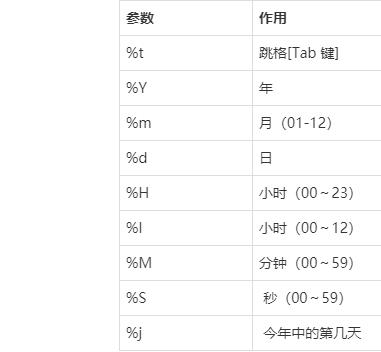一 先看date的帮助说明
首先看下帮助信息。
下面这个是在busybox中的帮助信息
root@host:/etc# date --h
date: unrecognized option '--h'
BusyBox v1.29.3 (2022-06-28 19:10:00 CST) multi-call binary.Usage: date [OPTIONS] [+FMT] [TIME]
Display time (using +FMT), or set time
[-s,--set] TIME Set time to TIME
-u,--utc Work in UTC (don't convert to local time)
-R,--rfc-2822 Output RFC-2822 compliant date string
-I[SPEC] Output ISO-8601 compliant date string
SPEC='date' (default) for date only,
'hours', 'minutes', or 'seconds' for date and
time to the indicated precision
-r,--reference FILE Display last modification time of FILE
-d,--date TIME Display TIME, not 'now'
-D FMT Use FMT for -d TIME conversionRecognized TIME formats:
hh:mm[:ss]
[YYYY.]MM.DD-hh:mm[:ss]
YYYY-MM-DD hh:mm[:ss]
[[[[[YY]YY]MM]DD]hh]mm[.ss]
'date TIME' form accepts MMDDhhmm[[YY]YY][.ss] instead
root@host:/etc#
下面这个是在ubuntu中的帮助信息,真的很长。
lkmao@ubuntu:/big/barcode/code$ date --help
用法:date [选项]... [+格式]
或:date [-u|--utc|--universal] [MMDDhhmm[[CC]YY][.ss]]
Display the current time in the given FORMAT, or set the system date.必选参数对长短选项同时适用。
-d, --date=STRING display time described by STRING, not 'now'
-f, --file=DATEFILE like --date; once for each line of DATEFILE
-I[FMT], --iso-8601[=FMT] output date/time in ISO 8601 format.
FMT='date' for date only (the default),
'hours', 'minutes', 'seconds', or 'ns'
for date and time to the indicated precision.
Example: 2006-08-14T02:34:56-0600
-R, --rfc-2822 output date and time in RFC 2822 format.
Example: Mon, 14 Aug 2006 02:34:56 -0600
--rfc-3339=FMT output date/time in RFC 3339 format.
FMT='date', 'seconds', or 'ns'
for date and time to the indicated precision.
Example: 2006-08-14 02:34:56-06:00
-r, --reference=FILE display the last modification time of FILE
-s, --set=STRING set time described by STRING
-u, --utc, --universal print or set Coordinated Universal Time (UTC)
--help 显示此帮助信息并退出
--version 显示版本信息并退出给定的格式FORMAT 控制着输出,解释序列如下:
%% 一个文字的 %
%a 当前locale 的星期名缩写(例如: 日,代表星期日)
%A 当前locale 的星期名全称 (如:星期日)
%b 当前locale 的月名缩写 (如:一,代表一月)
%B 当前locale 的月名全称 (如:一月)
%c 当前locale 的日期和时间 (如:2005年3月3日 星期四 23:05:25)
%C 世纪;比如 %Y,通常为省略当前年份的后两位数字(例如:20)
%d 按月计的日期(例如:01)
%D 按月计的日期;等于%m/%d/%y
%e 按月计的日期,添加空格,等于%_d
%F 完整日期格式,等价于 %Y-%m-%d
%g ISO-8601 格式年份的最后两位 (参见%G)
%G ISO-8601 格式年份 (参见%V),一般只和 %V 结合使用
%h 等于%b
%H 小时(00-23)
%I 小时(00-12)
%j 按年计的日期(001-366)
%k hour, space padded ( 0..23); same as %_H
%l hour, space padded ( 1..12); same as %_I
%m month (01..12)
%M minute (00..59)
%n 换行
%N 纳秒(000000000-999999999)
%p 当前locale 下的"上午"或者"下午",未知时输出为空
%P 与%p 类似,但是输出小写字母
%r 当前locale 下的 12 小时时钟时间 (如:11:11:04 下午)
%R 24 小时时间的时和分,等价于 %H:%M
%s 自UTC 时间 1970-01-01 00:00:00 以来所经过的秒数
%S 秒(00-60)
%t 输出制表符 Tab
%T 时间,等于%H:%M:%S
%u 星期,1 代表星期一
%U 一年中的第几周,以周日为每星期第一天(00-53)
%V ISO-8601 格式规范下的一年中第几周,以周一为每星期第一天(01-53)
%w 一星期中的第几日(0-6),0 代表周一
%W 一年中的第几周,以周一为每星期第一天(00-53)
%x 当前locale 下的日期描述 (如:12/31/99)
%X 当前locale 下的时间描述 (如:23:13:48)
%y 年份最后两位数位 (00-99)
%Y 年份
%z +hhmm 数字时区(例如,-0400)
%:z +hh:mm 数字时区(例如,-04:00)
%::z +hh:mm:ss 数字时区(例如,-04:00:00)
%:::z 数字时区带有必要的精度 (例如,-04,+05:30)
%Z 按字母表排序的时区缩写 (例如,EDT)默认情况下,日期的数字区域以0 填充。
The following optional flags may follow '%':- (hyphen) do not pad the field
_ (underscore) pad with spaces
0 (zero) pad with zeros
^ use upper case if possible
# use opposite case if possible在任何标记之后还允许一个可选的域宽度指定,它是一个十进制数字。
作为一个可选的修饰声明,它可以是E,在可能的情况下使用本地环境关联的
表示方式;或者是O,在可能的情况下使用本地环境关联的数字符号。Examples:
Convert seconds since the epoch (1970-01-01 UTC) to a date
$ date --date='@2147483647'Show the time on the west coast of the US (use tzselect(1) to find TZ)
$ TZ='America/Los_Angeles' dateShow the local time for 9AM next Friday on the west coast of the US
$ date --date='TZ="America/Los_Angeles" 09:00 next Fri'GNU coreutils online help: <http://www.gnu.org/software/coreutils/>
请向<http://translationproject.org/team/zh_CN.html> 报告date 的翻译错误
Full documentation at: <http://www.gnu.org/software/coreutils/date>
or available locally via: info '(coreutils) date invocation'
测试验证
说明一下,-s 表示设置时间,有四种可识别的格式,每个都学习一下,后来我又补充了第五条设置日期和时间,因为前四条在有些系统上使用失败。
1 设置时间:
参照 hh:mm[:ss]格式
date -s 17:03:55root@host:/etc# date -s 17:03:55
Sun Aug 22 17:03:55 UTC 1971
2 设置日期和时间1:
参照格式:[YYYY.]MM.DD-hh:mm[:ss]
date -s 2022.09.07-17:17:17root@host:/etc# date -s 2022.09.07-17:17:17
Wed Sep 7 17:17:17 UTC 2022
root@host:/etc#
3 设置日期和时间2:
参照格式:YYYY-MM-DD hh:mm[:ss]
这个格式中间有空格,所以时间字符串两边要加双引号。
root@host:~# date -s "2022-02-03 12:22:55"
Thu Feb 3 12:22:55 UTC 2022
root@host:~#
4 设置日期和时间3:
参照格式:[[[[[YY]YY]MM]DD]hh]mm[.ss]
root@host:~# date -s 202202020303.03
Wed Feb 2 03:03:03 UTC 2022
root@host:~#
5 设置日期和时间4:
我在另一个根文件系统使用前三种方式设置时间都不行:于是在网上找到了下面这种方式
date -s "20221012 14:29:00"
root@ATK-IMX6U:/# date -s "20221012 14:29:00"
Wed Oct 12 14:29:00 UTC 2022
root@ATK-IMX6U:/#
格式化显示时间和日期

最常见的用法就是直接使用date命令查看当前时间。需要注意,如果要安装指定的格式显示时间,我们需要在date 命令中输入以“+”号开头的参数,在下面的例子中我们会说明。
--按默认系统格式显示当前时间
root@ATK-IMX6U:/# date
Wed Oct 12 14:36:51 UTC 2022
root@ATK-IMX6U:/#
--显示当前时间的时分秒信息
root@ATK-IMX6U:/# date "+%H:%M:%S"
14:37:24
root@ATK-IMX6U:/#
--按照:2022-11-11 11:11:00的样式显示当前时间
root@ATK-IMX6U:/# date "+%Y-%m-%d %H:%M:%S"
2022-10-12 14:37:56
root@ATK-IMX6U:/#
--显示当前是今年的第几天
root@ATK-IMX6U:/# date "+%j"
285
root@ATK-IMX6U:/#


























 被折叠的 条评论
为什么被折叠?
被折叠的 条评论
为什么被折叠?










